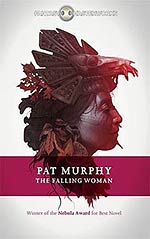
![]() thrak
thrak
11/21/2013
![]()
"Do not look for revelations in the ancient ruins. You will find only what you bring: bits of memory, wisps of the past as thin as clouds in the summer, fragments of stone that are carved with symbols that sometimes make sense."
After however many reviews of effusive praise, here's a book I have mixed feelings about. This isn't going to be a hatchet job like my review of 'Tau Zero'; I actually very much enjoyed 'The Falling Woman'. It's a well written and engaging book with a well researched and fully realised setting in which rounded characters act, for the most part, in a believable way. So why the reservation? Well, 'The Falling Woman' is a book by a white person about Mayans. Now, there's nothing inherently wrong with that, but whenever one encounters something like this the warning lights begin to flash somewhere in the back of one's head. White people don't have a great track record of writing non-offensive stories about Native Americans, from the reductive and patronising portrayal of them as the noble savage in Pocahontas/Dances With Wolves/Avatar to the source of mystical evil in Poltergeist. Pat Murphy is clearly someone who's done her research; I felt I learned a fair bit about archaeology and Mayan civilisation reading this book, and she takes care to portray the Mayans as individual people and not a homogeneous mass. This only makes it all the more disappointing when the only Mayan main character winds up playing the role of the villain, and her role in the story, and that of the disappearance of the Mayan civilisation, is to act as a plot device to repair the mother-daughter relationship between the two white main characters. Problematic.
Before I sink my claws in, I'd like to say a bit more about what was good about the book. 'The Falling Woman' follows archaeologist Elizabeth Butler, a woman who left her family behind to concentrate on her career, and Diane Butler, her estranged daughter, and Elizabeth's colleagues and students as they excavate a Mayan city in Yucatan. Elizabeth can see shadows of the past, which is no doubt useful for her job, but starts to become a problem when the shadow of a Mayan priest, Zuhuy-kak, begins talking back and tells her that the goddess requires a sacrifice from her. Last time the cycle of the goddess came around, Zuhuy-kak sacrificed her own daughter...
As you can imagine, writing Elizabeth Butler is quite the balancing act and something the author handles remarkably well for the most part. The simplest explanation is that Liz Butler is suffering from schizophrenia, but the book presents all her encounters with the past as natural and believable. For the most part she comes across as a prickly, fiercely independent woman who is a bit too wrapped up in her job. The book intelligently considers that what may be seen as madness in one context - for example, human sacrifice as practiced by the Maya - is seen as part of everyday life in another, and Liz is an example of this, a woman who never wanted to settle down and have a family but was coerced into it by the pressures of society, at great damage to herself. In a way, she has already sacrificed her daughter by abandoning her to be brought up by her father alone, which makes it all the more important that she doesn't sacrifice her a second time.
Diane Butler herself is another compelling character, forced to the brink by her father's death and beginning to inherit her mother's visions, afraid that she is going insane. The building of bridges between her and her distant mother, as they slowly come to understand and like each other better, is well done and genuinely quite moving.
Right, now that's done, scalpels out. 'The Falling Woman' recalls Michael Bishop's 'No Enemy But Time', which is another book about the past encroaching on the present. However 'No Enemy But Time' benefits from having a more racially diverse protagonist than the whiter than white leads in 'The Falling Woman'. 'No Enemy But Time' emphasises the similarities between ourselves and the Homo habilis that the protagonist spends time with, forms friendships and eventually a fulfilling relationship with; whilst in 'The Falling Woman' the Maya wind up being a threatening other.
For the little its worth, Zuhuy-kak initially appears as well drawn and ultimately sympathetic, and her point about her and Liz Butler being quite similar in their own way is well taken. However her reduction to cackling villainous joke by the end of the book is unwarranted and unpleasant. After the book has spent all this time trying to demystify the Mayan religion, it seems counter productive to have ghosts screaming for blood. Throughout the book, Mayans are referred to as Indians by professional archaeologists, who should know better. The curse of being a ghost is to lack your own agency, to be stuck outside looking in on the world of the living, only able to influence receptive people. The Maya as a whole are reduced to this in the book, a colourful backdrop for the story of the white protagonists to work out their issues against. So however much I enjoyed Pat Murphy's evocative writing, the book wound up leaving a bad taste in my mouth.
http://goldenapplesofthewest.blogspot.co.uk/2013/11/pat-murphy-falling-woman-1986.html